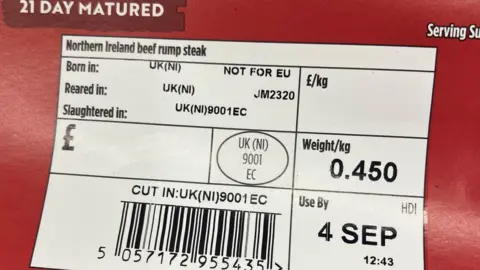Brexit: Asda is first NI supermarket to use 'Not for EU' label
 BBC
BBCAsda has become the first supermarket to start "Not for EU" labelling on some of its food in Northern Ireland.
The labelling is a requirement of the Windsor Framework, the revised Brexit deal for Northern Ireland.
It is not officially required until the start of October and is due to be rolled out across the rest of the UK in October 2024.
It is part of a broader package of changes to the 2019 Brexit deal for NI - known as the NI Protocol.
The protocol kept Northern Ireland inside the EU single market for goods, which allowed a free flow of goods across the Irish border.
However, it made trading from Great Britain to Northern Ireland more difficult and expensive.
Checks and controls on GB food products entering NI have been some of the biggest practical difficulties.
Under the Windsor Framework, UK public health and safety standards will apply for all retail food and drink in the UK internal market.
That means GB traders who are sending food for sale in Northern Ireland should face no routine checks and minimal paperwork.
 Getty Images
Getty ImagesThe flipside of this is the introduction of the "Not for EU" labels on GB food products, to give a level of assurance to the EU that products will not wrongly enter its single market.
From October, prepacked meat and fresh milk being sent from GB to NI will have to be individually labelled in that way, with labelling of other goods being rolled out by July 2025.
Businesses will also have to be registered as trusted traders to benefit from the reduced controls.
Asda has so far introduced the labelling on some of its own brand meat products.
'Light touch' approach
There has been concern in the retail industry that businesses have not had enough time to prepare for the labelling changes, meaning not all operators will be compliant in October.
However, the government has indicated that it will initially take a light touch approach to enforcement.
For example, in its most recent published advice it said that during the first few months of the new scheme "procedures will be in place" to ensure that businesses using an existing trusted trader scheme will benefit from the new arrangements.
Neil Johnson of the NI Retail Consortium, which represents major supermarkets, said the change in labelling does not affect the quality of the food.
"This is simply about keeping everybody happy," he added.
"Because we are next door to the EU, we have to respect their right to their internal market and this labelling is just an administrative procedure to assist that.
"It has nothing to do with the food. Hopefully supermarkets will be able to continue to supply the same value and range of goods as they do today."
